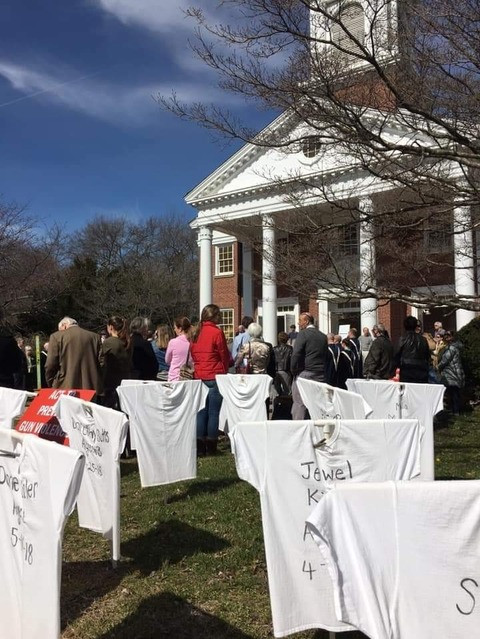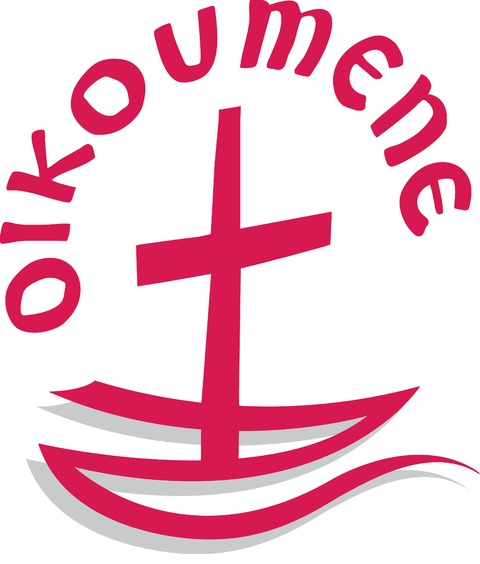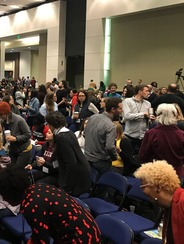|
|
From Jim: Holy Week and the Movement of Love and Liberation
|
| | Easter Sunday was an almost magical day when I was growing up in the American Midwest. The sights and smells and feelings evoked by that holy day still live with me.
The Easter lilies, the packed church, the full choir, everyone dressed up, the stirring chords of “Christ the Lord is Risen Today,” my father in his white robe, all of it was exciting. I am grateful for those memories.
And, yet, even though my preacher father, who never hesitated to speak against war, racism, and poverty, occupied the pulpit, it still seemed to be a Sunday in which the horror of Christ’s execution on false charges of treason failed to sink into the congregation.
The much smaller groups that attended Maundy Thursday and Good Friday services dwelled on betrayal, abuse, and torture. The Easter Sunday service was for those who wanted to celebrate the resurrection, to attend the party, to be there for the proverbial ticker tape parade.
As I have gotten older, it’s become much more difficult for me to separate the few hours between the murder of Jesus from the discovery that his body was missing. It was a brief and terribly confusing, fearful, and exhausting period.
Christ’s followers lived under Roman military occupation. Life was hard. Spies were everywhere. Roman soldiers were garrisoned in strategic locations. A puppet king ruled the land, popular resistance was not tolerated, and people yearned for freedom.
While Jesus was not the leader of a rebellion intended to throw off the Roman yoke, he understood the political and social context in which he lived. Read Walter Wink’s Bible study of Matthew 5:38-42. You cannot help but be moved by the brilliance of Jesus’ teachings and insights.
Thus, it is simply astonishing to consider that Christ’s message of love and healing and forgiveness has been transmuted by countless people over the centuries into a weapon to be used against others.
Jesus -- my Lord and Savior -- was a key leader in a centuries-old movement of love and liberation. While many yearn for his return and for what they perceive will be a time of instant gratification, the truth is, the realization of what he stood for will be achieved by all of us working together to change our hearts and minds and to remove the structures of oppression, hatred, and greed we have imposed upon ourselves.
Even during the Easter services I recall in which the blood and tears surrounding the lynching of Jesus were glossed over, we caught a glimpse of God’s preferred future for us. During this Holy Week, I pray you will commit yourself to the great movement of love and liberation.
|
|
| | Jim Winkler
President and General Secretary |
| | Church Fires in Louisiana and Paris
In the midst of Holy Week, world attention is focused on the accidental fire that very nearly consumed the Notre Dame Cathedral in Paris. Let us also remember the three African American Baptist churches recently burned to the ground in Louisiana by an intentional act of arson in what is being investigated as a hate crime.
The National Council of Churches is grateful for the generosity of many—which has already resulted in gifts and pledges of hundreds of millions of dollars—and the stated determination to rebuild Notre Dame. We encourage the same spirit of generosity in response to the GoFundMe effort to rebuild the three black Baptist churches in Louisiana. Over $1.9 million has been donated and much more is needed.
In addition to encouraging individual contributions, some of our congregations may choose to receive special offerings this Easter Sunday for the three churches in Louisiana. As we celebrate the resurrection of our Savior, Jesus Christ, may we also anticipate a renewal of hope for our sisters and brothers in both Louisiana and Paris. Our prayer is that God will bring forth beauty out of ashes.
|
| | | Our Cathedrals Matter Too
Our cathedrals matter too. They were built by men and women who washed the clothes of others. They ironed suits they could never afford to have themselves. While on their knees scrubbing floors of marble, they prayed.
Our cathedrals matter too. Burned time and time again by supremacists, yet rebuilt by the remortgaging of their own homes.
Our cathedrals matter too. They fried fish and chicken, and baked sweet potato pies.
Our cathedrals matter too. Our history matters too. Our labor matters too. Our cathedrals included safe rooms for the enslaved runaway and schools for their children.
Our cathedrals matter too. Do they matter to you?
#blackchurchmatters #notredame #thefreedomchurch
Holy Week 2019
Rev. Malcolm J. Byrd, Pastor
Jackson Memorial AME Zion Church
Hempstead, NY
|
| | | Presiding Bishop Curry: Easter 2019 Message
“In the moments of despair, in the moments of the worst darkness, God had done something incredible,” Episcopal Church Presiding Bishop and Primate Michael B. Curry said in his Easter 2019 Message. “God had raised Jesus from the dead.”
The Festive day of Easter is Sunday, April 21.
|
| | |  |
Bishop Elizabeth Eaton's Easter Message
Getting a phone call in the middle of the night is never a good thing. I remember the second time my father had open-heart surgery. It was a long procedure and a difficult one, and after it was done the doctor called us to his office and said, “There’s been some bleeding. We’ll let you know, but you should go home now and rest.” And so going home that night, I listened for a phone call in the middle of the night and was awakened only to find out it was morning and it was birds singing, not the phone ringing. My father had made it through the night, and in fact he did recover from the surgery.
This is the joy we feel at Easter, but magnified. All of the hope that had been dashed on Good Friday, the terrible pressure of grief, the terrible pressure of knowing there was no future in the world, only on Sunday to be greeted not by the ringing of a telephone announcing death but the loud clear singing of alleluias. This is the joy we have, and it’s a promise so strong that even when we do die, even when we do confront death, we have the hope and the assurance of eternal life.
|
| | | Lament and Hope: A Pan-African Devotional Guide
In 2019, after centuries of structural change, protests, and policy reforms most often led by Africans and people of African descent, why do these groups still experience such disproportionately high percentages of hunger and poverty today? And why is there still such a wide wealth and income gap between these groups and individuals of European and Asian descent?
An essential part of the answer lies in the history of the Quad-Centennial of the transatlantic voyage of African peoples from the country of Angola in 1619 to Jamestown, Virginia. The practice, and later policy, of enslaving African peoples before, during, and after this time are the foundation on which inequitable policies were established. Additionally, these policies have informed a practice and culture of colonization, racism, and Afrophobia around the world.
In light of this historic moment, Bread for the World is honored to produce and dedicate the new 2019 Quad-Centennial monthly devotional, “Lament and Hope: A Pan-African Devotional Guide Commemorating the 2019 Quad-Centennial of the Forced Transatlantic Voyage of Enslaved African Peoples to Jamestown, Virginia (USA).” The devotional celebrates the hope, faith, and resistance of African and African-descended people, while also lamenting the evil and horror of the history of enslavement, racism, and inequitable policies, many of which are still present today. In addition, this Christian devotional acknowledges and seeks to inspire readers to address the resulting consequences of hunger and poverty through advocacy. Rev. Dr. Angelique Walker-Smith, Sr. Associate for Pan African and Orthodox Church Engagement for Bread for the World, serves as editor of the devotional.
|
| | | | |  |
WCC expresses sadness, solidarity after Notre Dame fire
After a large fire broke out on 15 April at the Notre Dame cathedral, World Council of Churches (WCC) general secretary Rev. Dr Olav Fykse Tveit expressed shock over the damage to one the most famous landmarks in Paris, and the seat of the archbishop of Paris.
“We grieve over the incalculable loss as the Notre Dame cathedral burns,” said Tveit, “and we pray for all for whom Notre Dame is and represents a spiritual home, particularly during Holy Week.”
Tveit said he especially remembers a 4 December 2015 ecumenical service in which hundreds of people from many nations and confessions, among them pastors, priests, laity, nuns, bishops, archbishops and cardinals, joined in a service for God’s Creation at Notre Dame cathedral in Paris during the United Nations climate conference being held then in the city.
“As we prayed for our common home, the beautiful setting of the cathedral served to draw us even closer together,” recalled Tveit. “As decisions are made about repairing the structure, we will pray for the firefighters who preserved what they could, for those craftspeople who will be doing the repairs, and for those millions of people for whom the cathedral holds so much meaning.”
|
| | |
|
 |
White Privilege Conference draws 1,300 attendees to Eastern Iowa
Thirteen hundred people are gathered in this Eastern Iowa community through Saturday for the 20th White Privilege Conference. Attendees were treated Thursday to a pair of thoughtful keynote addresses and the first of what will be their choice of more than 100 workshops.
Relationships — “imbued with love and accountability” — are at the heart of racial justice work, said morning keynoter Dr. Heather Hackman, who consults nationally on issues of equity and social justice.
The trouble is that many white liberals stand on the shore watching others row in the race toward inclusion, she said. “We contribute to rowing causes, but we are safe and comfortable on the shore,” she said. “What will it take to swim out to the boat and row? After we do, we realize what a tiny patch of shore that was. How did I confuse that for a whole, full life?”
And a caveat for white people who do start rowing: “Please don’t stick a flag in the boat and say, ‘I discovered a boat!’ And don’t offer to do a spreadsheet on rowing patterns,” she said. “Just row!”
The white racial narrative, she noted — the stories white people often tell themselves — include the view they’re rugged individualists, honest and hard-working. Their time is more important than relationship-building. They own things, they’re in charge, they’re doers and they see themselves as innocent until proven otherwise.
But rugged individualism “is an incredibly lonely way to live,” she said.
|
| | | | Ecumenical Opportunities:
The World Council of Churches Seeks a Programme Executive on Mission and Evangelism/Mission from the Margins: This person will facilitate and support an inspiring and effective involvement of Indigenous Peoples and other marginalized groups of Mission from the Margins in the life and work of the WCC, its member churches and ecumenical partners.
NCSS-RFC Religious Studies Summer Institute, July 9-11, 2019, Washington, DC
The Religious Freedom Center of the Freedom Forum Institute and the National Council for the Social Studies invite you to join us at the Newseum in Washington, DC to:
- Increase professional competence related to the disciplinary concepts and tools of religious studies as an academic discipline.
- Increase personal confidence in teaching about religion in constitutionally appropriate ways that engage key stakeholders in your school context.
- Develop working relationships with leading religious studies subject matter experts and curricular resource providers.
For more details click here.
Religious Studies Institute for Independent Schools, July 23-25, 2019, Washington, DC
The Religious Freedom Center of the Freedom Forum Institute will host the Summer Religious Studies Institute at the Newseum. The program will convene K-12 independent school educators in the nation's capital to explore issues of religious literacy, civil dialogue and the challenges and opportunities of navigating religious diversity in the classroom.
Independent school educators will learn about religious studies as an academic discipline and increase personal confidence in navigating religiously and ideologically diverse classrooms while upholding their schools' missions. Co-conveners include the Thales Academy, the Council of Islamic Schools in North America, Sacred Heart Schools, and the National Catholic Educational Association.
For more details click here. |
| | Serving as a leading voice of witness to the living Christ in the public square since 1950, the National Council of Churches of Christ in the USA (NCC) brings together 38 member communions and more than 40 million Christians in a common expression of God's love and promise of unity. |
| | | |